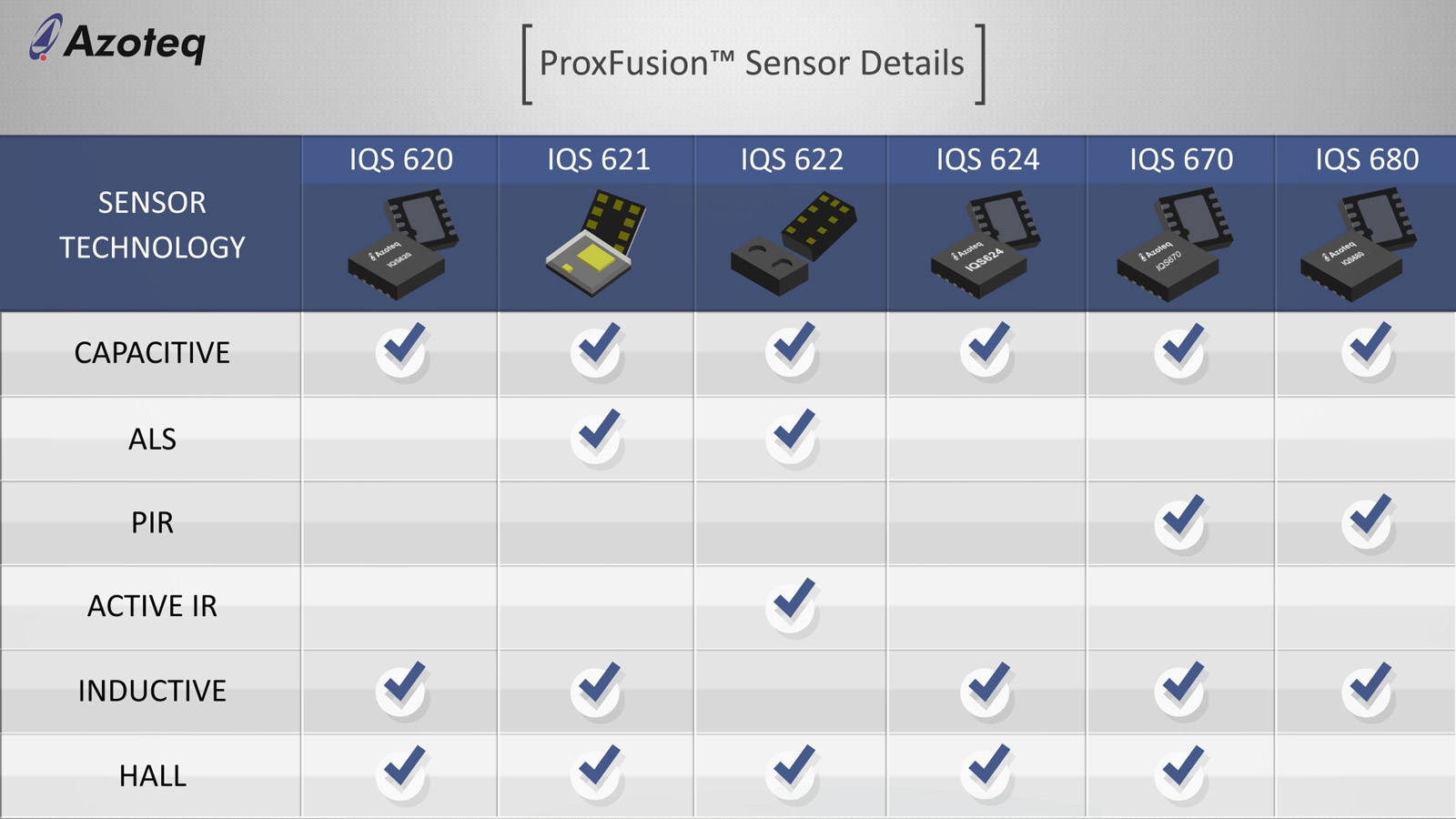Library to read and write Azoteq IQS6xx device registers via I2C.
Dependents: IQS620_HelloWorld IQS622_HelloWorld IQS624_HelloWorld IQS621_HelloWorld ... more
Library: IQS62x
Library to read and write Azoteq IQS6xx device registers via I2C.
Supported Devices
Handy Table of ProxFusion Device Features
ALS = Ambient Light Sensor PIR = Passive Infrared

Revision 12:5a9bbbd6e312, committed 2017-05-12
- Comitter:
- AzqDev
- Date:
- Fri May 12 23:14:44 2017 +0000
- Parent:
- 11:4d6d1da5bd31
- Child:
- 13:71f8ee16a3a1
- Commit message:
- Track read & write changes to registers
Changed in this revision
| IQS62x.cpp | Show annotated file Show diff for this revision Revisions of this file |
| IQS62x.h | Show annotated file Show diff for this revision Revisions of this file |
--- a/IQS62x.cpp Fri May 12 14:55:20 2017 +0000
+++ b/IQS62x.cpp Fri May 12 23:14:44 2017 +0000
@@ -9,23 +9,33 @@
#include "IQS62x.h"
// constructor
-IQS62xIO::IQS62xIO() :
+IQS62xIO::IQS62xIO() :
i2c( IQS_I2C_DATA_PIN, IQS_I2C_CLOCK_PIN ), // first run the constructor for mbed class I2C
IQSready( IQS_READY_PIN ) // first run the constructor for mbed class DigitalIn
-{
+{
registers = I2CBuffer; // pointer to the receive buffer
I2CErrorCount = 0; // reset I2C error count
i2c.frequency( I2Cspeed ); // I2C clock frequency
-}
+
+ // this uses memory but is very handy in diagnostics
+ memset(writeFlag, 0, I2CBufferSize); // a table to remmber if we wrote to a register
+ memset(lastWrite, 0, I2CBufferSize); // a table to remember what we wrote to a register
+ memset(lastRead, 0, I2CBufferSize); // a table to remmber what we read the previous read cycle
+ memset(readChanges, 0, I2CBufferSize); // a table to mark up any registers that changed since the previous read
+ memset(writeChanges, 0, I2CBufferSize); // a table to mark up any registers that differs from what was written to it
+}
// write a single byte to an IQS62x register
-void IQS62xIO::writeRegister(int address, int data) {
+void IQS62xIO::writeRegister(int address, int data)
+{
+ writeFlag[ address & 0xff ] = 1; // remember which registers we changed
+ lastWrite[ address & 0xff ] = data & 0xff; // remember what we wrote
char twoBytes [2];
int numberOfBytes = 2;
twoBytes[0] = address & 0xff;
twoBytes[1] = data & 0xff;
- waitForReady();
- if(0!=i2c.write(I2C_ADR,twoBytes,numberOfBytes,false))
+ waitForIqsReady();
+ if(0!=i2c.write(I2C_ADR,twoBytes,numberOfBytes,false))
I2CErrorCount++;
}
@@ -33,34 +43,56 @@
#include "deviceType.h" // to check if we should override the configuration definition
#ifndef OVERRIDE_CONFIGURE
// if there is no override for configure() then we use this simple version
-void IQS62xIO::configure() {
+void IQS62xIO::configure()
+{
writeRegister(0xd0,0x40); // simplest config : just acknowledge/clear the reset flag
}
#endif
// read N registers, starting at provided offset
-void IQS62xIO::readIqsRegisters(int start, int count){
+void IQS62xIO::readIqsRegisters(int start, int count)
+{
memset(I2CBuffer,0x55,I2CBufferSize); // "clear" i2c receive buffer
- waitForReady();
- char i2c_start_address [1];
+ waitForIqsReady();
+ char i2c_start_address [1];
i2c_start_address[0] = start & 0xff;
int numberOfBytes = 1;
// write start address to the IQS62x address register
- if(0!=i2c.write(I2C_ADR,i2c_start_address,numberOfBytes,false))
+ if(0!=i2c.write(I2C_ADR,i2c_start_address,numberOfBytes,false))
I2CErrorCount++;
- waitForReady();
+ waitForIqsReady();
numberOfBytes = count % I2CBufferSize;
// read register values into a buffer
if(0!=i2c.read(I2C_ADR,I2CBuffer,numberOfBytes,false))
I2CErrorCount++;
+
+#define PLEASE_CHECK_FOR_IQS_CHANGES 1
+#ifndef DONT_CHECK_FOR_IQS_CHANGES
+ // this is optional but handy diagnostics
+ // we build two tables:
+ // writeChanges[i] is set to 1 if the register content differs from what we wrote to it
+ // readChanges[i] is set to 1 if the register value differs from the previously read value
+ for(int i=0; i<I2CBufferSize; i++) {
+ if (writeFlag[i] == 1) { // only if we previously wrote to this register we check it
+ if( I2CBuffer[i] != lastWrite[i] )
+ writeChanges[i]=1; // if register different from what we wrote, mark it
+ }
+ if ( I2CBuffer[i] != lastRead[i] )
+ readChanges[i]=1; // if register differs from previous read, mark it
+ else
+ readChanges[i]=0; // no change, no flag
+ }
+ memcpy(lastRead, I2CBuffer, I2CBufferSize); // preserve data for next round
+#endif
}
// wait for IQS62x to provide a ready signal (low) on IQS62x_ready pin
-void IQS62xIO::waitForReady() {
- int timeout=0;
+void IQS62xIO::waitForIqsReady()
+{
+ int timeout=0;
while (1) {
if(IQSready==1) break;
- if (timeout++ > 1000000) goto fatal_error;
+ if (timeout++ > 1000000) goto fatal_error;
}
timeout=0;
while (1) {
@@ -68,6 +100,6 @@
if (timeout++ > 1000000) goto fatal_error;
}
return;
- fatal_error:
- error ("Fatal Error: IQS62x ready pin is not toggling");
+fatal_error:
+ error ("Fatal Error: IQS62x ready pin is not toggling");
}
\ No newline at end of file
--- a/IQS62x.h Fri May 12 14:55:20 2017 +0000
+++ b/IQS62x.h Fri May 12 23:14:44 2017 +0000
@@ -31,7 +31,14 @@
DigitalIn IQSready; // ready pin
const static int I2Cspeed = I2CSPEED; // I2C clock rate
int I2CErrorCount; // number of I2C errors
- char I2CBuffer [I2CBufferSize]; // I2C read buffer
+ char I2CBuffer [I2CBufferSize]; // I2C read buffer
+
+ char writeFlag [I2CBufferSize]; // to remember our if we wrote to this register
+ char lastWrite [I2CBufferSize]; // to remember what we wrote to this register
+ char lastRead [I2CBufferSize]; // to remember what we read from this register
+ char readChanges [I2CBufferSize]; // to log changes from previous read
+ char writeChanges [I2CBufferSize]; // to log changes from what we wrote
+
char * registers; // pointer to I2C read buffer
IQS62xIO(); // constructor
@@ -39,5 +46,5 @@
void configure(); // write configuration registers of the IQS62x
void readAll(); // read all registers from the IQS62x
void readIqsRegisters(int start, int count); // starting at "start" read count registers
- void waitForReady(); // wait for IQS62x ready signal
+ void waitForIqsReady(); // wait for IQS62x ready signal
};
\ No newline at end of file
 IQS624
IQS624
 IQS620A
IQS620A
 IQS620A-EVAL-1
IQS620A-EVAL-1
 IQS621
IQS621
 IQS621-EVAL-1
IQS621-EVAL-1
 IQS622
IQS622
 IQS622-EVAL-1
IQS622-EVAL-1
 IQS624-EVAL-1
IQS624-EVAL-1